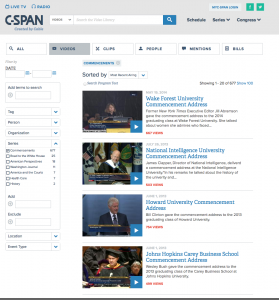Commencement: What do the speeches teach us?
If you are connected to a university, you’ve likely already gotten your annual dose of inspiration.
If you are connected to a high school, you are either awaiting that traditional commencement moment, or preparing for it.
Commencement speeches are also interesting to study. They are primary sources. They are models for learning about rhetoric. And now they are easily available for both inspiration and analysis. With these speeches easy to embed, they can easily be juxtaposed for comparison. And they (are supposed to) speak to young people.
And perhaps you’ve been intrigued by how politically charged the choice of a commencement speaker has become.
C-SPAN offers a Video Library of Commencement Speeches, 677 and growing. Closed caption transcripts are available. Videos may be clipped, embedded, bookmarked to MYC-SPAN,

The most recent of the speeches was delivered this week by former New York Times Executive Editor Jill Abramson to the 2014 graduating class at Wake Foresst.
NPR recently launched an app for which it handpicked more than 300 speeches going way back to 1774, searchable by name, school, date and tagged theme. Results link to either text or videos of the speeches.
 NPR has already done some analysis, skipping and slogging through 50 YouTube favorites, searching for highlights, lowlights and clichés, to create its Commencement Mashup: The Speech In 8 Easy Steps. If you don’t have the 2.55 minutes, here they are (spoiler alert!): Remind the audience how old you are Lower their expectations Tell them to follow their hearts Remind them it’s not easy Tell ‘em a secret Be profound Keep them humble Visit NPR.org/ed for further research
NPR has already done some analysis, skipping and slogging through 50 YouTube favorites, searching for highlights, lowlights and clichés, to create its Commencement Mashup: The Speech In 8 Easy Steps. If you don’t have the 2.55 minutes, here they are (spoiler alert!): Remind the audience how old you are Lower their expectations Tell them to follow their hearts Remind them it’s not easy Tell ‘em a secret Be profound Keep them humble Visit NPR.org/ed for further research Your classes may want to do some further analysis relating to such elements as: rhetorical devices, historical perspective, bias, claim, emotional appeals, social values, etc. Your class may want to carefully consider why a particular commencement speaker was selected for a particular class, place and time. You may want to challenge your classes to create and deliver even more effective speeches with messages that resonate even longer and louder.
For some speech analysis inspiration:
ReadWriteThink: Analyzing Famous Speeches as Arguments UT Arlington: Critically Analyzing a Speech Ford’s Theater: Teaching Historical Speeches in Middle and High School Classrooms SALT Rhetorical Analysis WorksheetHandy links to portals I mentioned:
NPR’s Best Commencement Speeches, Ever app C-SPAN’s Video Library of Commencement SpeechesYou may also be interested in:
Time Top Ten Commencement Speeches USA Today 12 Best Commencement Speeches of All Time Yahoo! Directory Graduation Speeches HLNTV Most Inspiring Graduation Speeches of 2014 GradSpeeches.com GraduationWisdom.com (quotes and speeches collected by Cristina Negrut) who also compiled the 2014 Graduation Speakers List and shared the best dance clip.Also refer to CCSS ELA Anchor Standards Reading and Speaking and Listening.
Thanks to Gary Price @infodocket for the NPR/C-SPAN leads.
![]()
RELATED
The job outlook in 2030: Librarians will be in demand
The job outlook in 2030: Librarians will be in demand
ALREADY A SUBSCRIBER? LOG IN
We are currently offering this content for free. Sign up now to activate your personal profile, where you can save articles for future viewing






Add Comment :-
Be the first reader to comment.
Comment Policy:
Comment should not be empty !!!